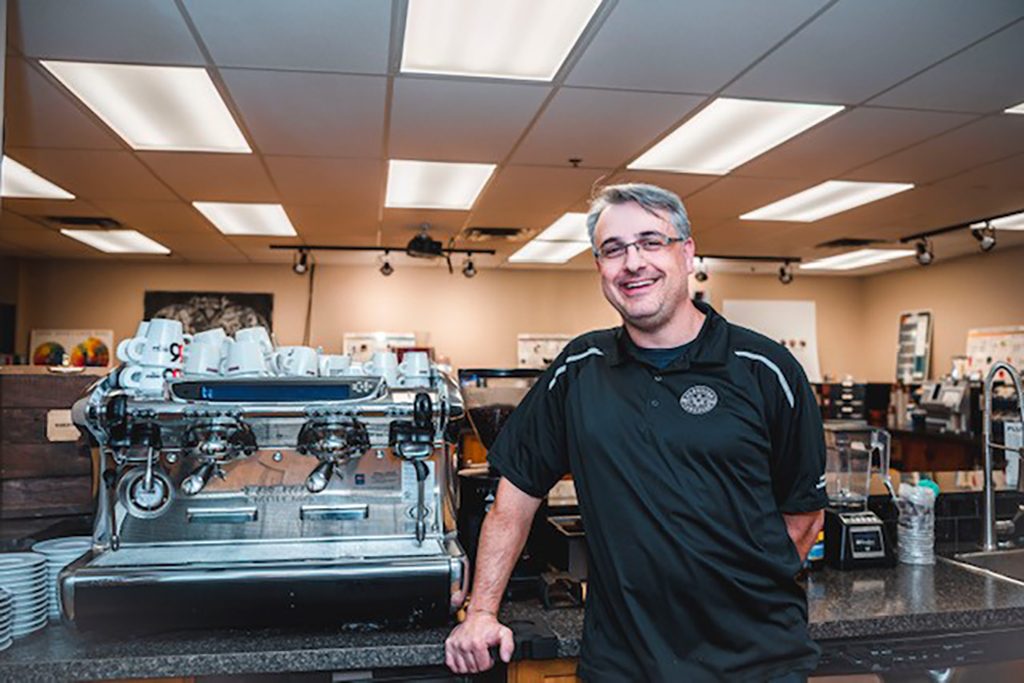For 12 years until early this year, Dario Fogliatti worked as a driver for United Rentals, delivering construction equipment in and around Edmonton.
“Today my occupation is completely different,” he said. “Now I’m a coffee service technician.”
In January 2019, Fogliatti was diagnosed with irreparable Epicondylitis in his left elbow.
Epicondylitis is a repetitive motion strain that, in Fogliatti’s case, was caused by years of chaining down equipment many times a day. (Athletes can experience a variation of the condition called tennis elbow.)
Fogliatti’s claim with Workers’ Compensation Board of Alberta entailed physical rehabilitation and vocational consulting at WCB’s Millard Treatment Centre in Edmonton.
“Rehab at the Millard was awesome,” said Fogliatti. “I went in for half a day, every day for two months. From Day One I had an awesome team – doctor, fitness assessor, physiotherapist – helping me.”
Fogliatti’s rehabilitation team put him through exercises, stretches, cardio and weights.
“At the end of two months, I went in for vocational counselling,” said Fogliatti. “After considering my options and what I thought I’d like to, I decided to retrain as a coffee technician.”
Fogliatti took part in WCB Alberta’s Training on the Job (TOJ) program, one of several it offers to help injured workers get back on their feet again and into productive employment.
Specifically, TOJ helps workers who need to pursue work in a new job or field after a workplace accident.
The program connects workers with employers who can provide them practical, on-the-job experience in the occupation they want to pursue.
WCB provides financial assistance to the employer to support the costs of training, including subsidizing the worker’s wages.
Another program offers modified work and return-to-work planning support. Throughout the life of a claim, WCB works with employees, their employers and health care providers to ensure a safe recovery and return to work.
WCB helps identify opportunities for suitable modified work that can help a worker make a safe and gradual return to their work.
Finally, comprehensive re-employment services are for workers who may not be able to return to their previous jobs due to their injury.
WCB provides them with financial support and coaching while they look for a suitable new job.
Other provinces have similar programs for returning injured workers to productive employment, a complete survey of which is beyond the scope of this article.
In New Brunswick, for example, a similar facility to Millard is WorkSafeNB’s Rehabilitation Centre (WRC), located near Saint John. WRC has 25 therapists in physiotherapy, occupational therapy and social work.
Approximately100 of the 600 injured workers who go through WRC each year are from the construction industry.
A typical WRC program might involve occupational and physical therapy, as well as counseling, and may last 6-7 weeks, depending on the nature of the injury.
WRC will cover travel and accommodation for anyone who lives outside greater Saint John.
Saskatchewan WCB provides training, including counselling, for workers who are unable to return to their pre-injury job, to help them make the transition to other work.
It also offers training to help employers set up a return-to-work program, as part of an injury prevention practice.
WorkSafe Saskatchewan, a partnership between WCB and the Ministry of Labour Relations and Workplace Safety, offers a course called Effective Return to Work.
It teaches supervisors and business owners how to form committees, create their own policies and plan procedures to facilitate a return-to-work program.
The course includes templates, forms and step-by-step instructions for small and large companies.
In Manitoba, should an injured worker be unable to return to their pre-injury job and modified or alternate employment is not available with the accident employer, a WCB vocational rehabilitation consultant is assigned to assist.
The consultant reviews the worker’s skills and abilities in relation to other occupational fields where they might be deemed to be employable.
Training, education and job search support may be components of the vocational rehabilitation process.
The WCB of Manitoba offers Return to Work Basics workshops to employers and their representatives throughout the year.











Recent Comments
comments for this post are closed